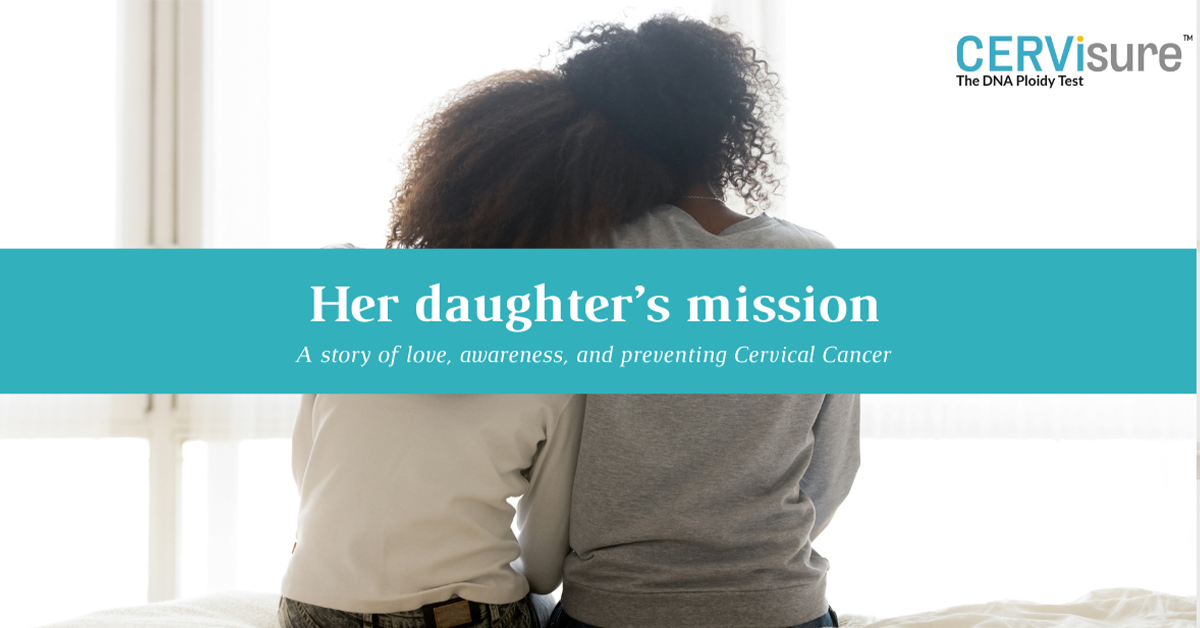Her daughter’s mission: A story of love, awareness, and preventing Cervical Cancer

Arpita leaned back into her office chair, smiling, as she closed her laptop. She had just landed a job that offered her more than she could ever imagine—a position in her dream company, a cozy apartment close to work, and an unparalleled sense of achievement.
Now, it was time to give back.
Arpita recalled the sacrifices her mother Maya had made while raising her and her brother Shree, as a single parent.
Arpita was now a girl on a mission. She wanted to ensure that her mother finally got the care she deserved.
A recent seminar at work on preventive health sparked her interest, especially around cervical cancer. “Did you know?” the presenter had said, “that cervical cancer is one of the most common cancers in women and often strikes in their 40s or later?” The words lingered in her mind. They made her think of Maya immediately, now in her early 50s, and the fact that her mother had never had time for her own health.
Driven by both worry and love, Arpita began reading everything she could about how to prevent cervical cancer. She learned that cervical cancer doesn’t appear overnight—it grows slowly over years.
Screening, the experts said, was key, especially a method called the DNA Ploidy test that could warn them about the risk factors of cervical cancer and help catch signs of trouble before they developed into cancer.
The next weekend, as she sat with her mother over their routine Saturday morning coffee, Arpita gently steered the conversation.
"Mom," she started gently, "I’ve been thinking... now that things are falling into place for me, maybe it’s time you focused a little on yourself."
Maya looked at her daughter, surprised. “I am enjoying my life, beta! Seeing you and your brother thrive makes my heart full; what more could I ask for?”
“True,” Arpita replied, her voice warm with love for her mother, “but part of enjoying life is staying healthy to keep enjoying it. There’s something I want you to look into… It’s about cervical cancer.”
The mention of “cancer” drew a shadow over Maya’s face. “Isn’t that a disease for younger people?” she asked hesitantly.
“While all women are at risk, those over the age of 40 have a higher likelihood of developing cervical cancer. It’s sad that many don’t realize it until it’s too late. There are ways to catch it early—tests that look for unusual cells and even more precise ones like the DNA Ploidy test. I just want you to be safe.”
They sat in silence for a moment, as Maya processed the information. Arpita knew it was overwhelming, but it was worth it if it meant keeping her mother safe.
Maya appeared deep in thought. She asked Arpita if she could tell her more about it.
Arpita seized the moment, explaining the risk factors of cervical cancer she had learned: smoking, early marriage, multiple pregnancies, and certain infections. She shared the importance of regular screening and how simple lifestyle changes, like eating well and regular check-ups, could make a difference.
"I’ve been learning about ways to prevent cervical cancer, Mom," she said, "and awareness is the first step."
“And what about symptoms of cervical cancer?” Maya asked, curiosity replacing her initial worry.
Arpita nodded, relieved that her mother was engaged. "The signs of cervical cancer are mild to non-existent, which is why staying consistent with check-ups is so very important."
As Arpita spoke, Maya realized she had been so focused on raising her kids and managing life’s endless responsibilities that her own well-being had taken a back seat. But now with her daughter’s encouragement she felt it was time to take a step toward self-care.
“Alright,” Maya said, a gentle smile forming. “I’ll go for the screening. And we can explore this DNA Ploidy test you mentioned. If it gives you peace of mind, then it’s definitely worth doing.”
Feeling a wave of relief and gratitude, Arpita reached across the table to squeeze her mother’s hand. She had transformed her concern into something tangible—an action plan, a step toward securing her mother’s future.
After Maya’s screening, the gynaecologist turned to Arpita with a warm smile. "What you’re doing is truly admirable, Arpita," the doctor said with a warm smile. “It’s uncommon to find young individuals like you who are so enthusiastic and outspoken about their parents' health. Your care and foresight may well keep your mom safe. She’s lucky to have you.”
The three women shared a moment of mutual understanding, recognizing that prevention went beyond medical tests. It was rooted in love, awareness, and the commitment to ensure that every woman feels equipped and supported if a battle lies ahead.
As they waited together for the results, Maya realized her daughter had given her more than just a push toward health—she had offered her a sense of safety, support, and, most importantly, a feeling of being truly seen. In return, she insisted that Arpita book her own appointment with the gynaecologist soon.



